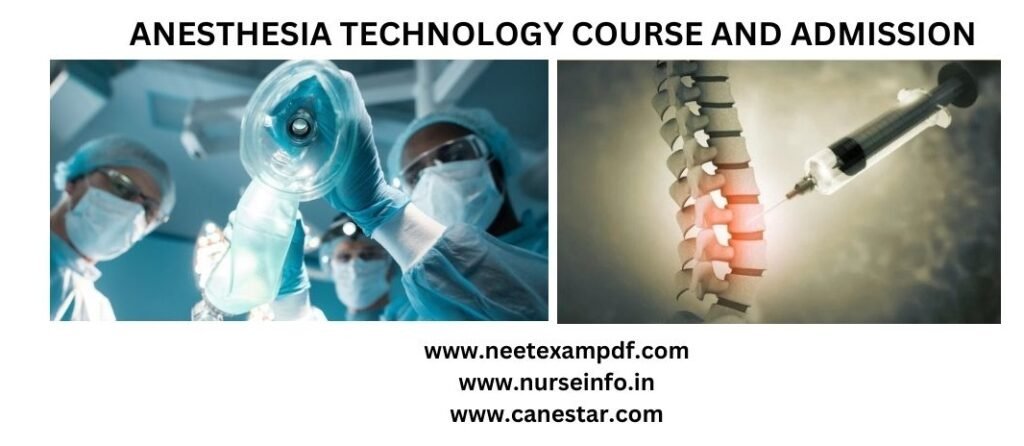ANESTHESIA TECHNOLOGY COURSE
ANESTHESIA TECHNOLOGY – COURSE, ELIGIBILITY, DURATION, COURSE CURRICULUM, FEE STRUCTURE, CAREER OPPORTUNITY (ABROAD) AND SALARY
Bachelor degree in Anesthesia technology is a medical course, course designed to study anesthesia procedures, help medical professionals during surgery and handling anesthesia equipment.
ROLE OF ANESTHESIA TECHNOLOGIST
- Patient monitoring, anesthetic agents, dose and equipment, techniques and supplies.
- Anesthesia technologist helps to support doctors and surgeons during surgery giving proper dose of anesthesia.
ANESTHESIA TECHNOLOGIST OFFERING COLLEGES
- Manipal College of Allied Health Sciences, Manipal
- Rajiv Gandhi University of Health Sciences, Bangalore
- Sri Ramachandra Institute of Higher Education and Research, Chennai
- All India Institute of Medical Sciences (AIIMS), New Delhi
- Christian Medical College (CMC), Vellore
- Amrita Institute of Medical Sciences, Kochi
- Narayana Health, Bangalore
- Medvarsity Online Ltd. (Apollo Group), Hyderabad
COURSE ELIGIBILITY
In India, the eligibility criteria for Anesthesia Technologist courses may vary slightly between institutions. However, here are some common eligibility requirements for Anesthesia Technologist courses in India:
- Educational Qualifications: Candidates should have completed their higher secondary education or its equivalent (10+2 level) 45 % grade from a recognized board, such as CBSE, ICSE, or State Boards.
- Science Background: Candidates are generally required to have a background in science subjects, including Physics, Chemistry, and Biology. Some institutions may also require Mathematics as a compulsory subject.
- Minimum Marks: Most institutions have minimum percentage or grade requirements in the qualifying examination (10+2 level). The specific minimum marks can vary between institutions.
- Age Limit: There is usually no specific age limit for admission to Anesthesia Technologist courses. However, candidates should meet the age requirements set by the institution or university where they are applying.
- Entrance Exams: Some institutions may conduct entrance exams as part of the admission process. These exams evaluate the candidates’ aptitude, subject knowledge, and other relevant skills. The specific entrance exams can vary between institutions.
- Other Requirements: Institutions may have additional requirements, such as a personal interview or group discussion as part of the selection process. Some institutions may also consider the candidate’s extracurricular activities, work experience, or medical fitness.
COURSE CONTENT
Anesthesia Technologist courses are designed to provide students with the necessary knowledge and skills to assist anesthesiologists in various medical settings. The specific programs may vary depending on the institution and the country. However, here are some common topics and components that are typically included in Anesthesia Technologist course programs:
- Anesthesia Basics: Introduction to anesthesia, its history, principles, and different types of anesthesia techniques.
- Anatomy and Physiology: Study of human anatomy and physiology, particularly focusing on the respiratory, cardiovascular, and nervous systems.
- Pharmacology: Understanding the pharmacological agents used in anesthesia, their actions, side effects, and interactions.
- Anesthesia Equipment: Familiarization with anesthesia machines, monitors, ventilators, and other equipment used during anesthesia administration.
- Patient Assessment: Learning how to assess patients’ physical condition, medical history, and anesthesia requirements, including preoperative evaluation and risk assessment.
- Anesthesia Techniques: Understanding different anesthesia techniques, such as general anesthesia, regional anesthesia, sedation, and pain management.
- Patient Monitoring: Training in monitoring vital signs, such as heart rate, blood pressure, oxygen saturation, and end-tidal carbon dioxide levels during anesthesia.
- Anesthesia Procedures: Practical training in assisting during various anesthesia procedures, including airway management, intravenous access, and drug administration.
- Sterilization and Infection Control: Knowledge of sterilization techniques, infection control practices, and maintaining aseptic conditions in the operating room.
- Emergency Situations: Preparation for handling emergencies during anesthesia, including airway management, cardiac arrest, and anaphylaxis.
- Documentation and Record Keeping: Understanding the importance of accurate documentation and maintaining patient records during anesthesia procedures.
- Ethical and Legal Considerations: Awareness of ethical and legal responsibilities in the field of anesthesia, patient confidentiality, and professional conduct.
- Clinical Practicum: Hands-on training in clinical settings, where students gain practical experience under the supervision of experienced anesthesiologists or anesthesia technologists.
- CSSD Procedures
- Applied pathology
- Clinical Anesthesia technology
- Applied Anesthesia technology
- Post Anesthesia care unit
- Advanced anesthesia technology
- Anesthetic techniques
FEE STRUCTURE
The average fee for Bachelor degree in Anesthesia is 30,000 to 5,00,000 INR.
COURSE DURATION
The duration of Anesthesia Technologist courses can vary depending on the country, educational institution, and the level of the program. Generally, the duration of Anesthesia Technologist courses can range from one to four years. Here are some common program durations for Anesthesia Technologist courses:
- Diploma/Certificate Programs: Diploma or certificate programs in Anesthesia Technology typically have a duration of one to two years. These programs provide focused training and are suitable for individuals seeking entry-level positions in the field.
- Bachelor’s Degree Programs: Bachelor’s degree programs in Anesthesia Technology or Anesthesia Technologist generally have a duration of three to four years. These programs offer a more comprehensive curriculum, including both theoretical knowledge and practical training.
SALARY
An average the anesthetist earns around 6.2 to 7.2 Lakhs.
CAREER OPPORTUNITY
Anesthesia technologist can work in different healthcare facilities such as hospitals, healthcare organizations, insurance, pharmaceuticals and supply firms.
ABROAD OPPORTUNITY
Becoming an Anesthesia Technologist can provide opportunities to work abroad, as healthcare professionals in this field are in demand worldwide. Here are a few potential opportunities for Anesthesia Technologists to work abroad:
- International Hospitals and Medical Centers: Many countries, especially those with advanced healthcare systems, hire Anesthesia Technologists from other countries to fill their workforce gaps. Research and explore opportunities in countries such as the United States, Canada, the United Kingdom, Australia, New Zealand, and countries in the Middle East.
- Global Health Organizations and NGOs: International organizations and non-governmental organizations (NGOs) often have projects and initiatives in various countries. They may require Anesthesia Technologists to support healthcare programs, disaster relief efforts, or medical missions.
- Medical Tourism Industry: Countries that attract medical tourists often require skilled healthcare professionals, including Anesthesia Technologists, to provide quality care to patients. Look for opportunities in countries known for medical tourism, such as Thailand, India, Malaysia, and Costa Rica.
- Locum Tenens and Travel Assignments: Anesthesia Technologists can explore locum tenens or travel assignments, where they temporarily fill staffing needs in healthcare facilities abroad. This allows professionals to work in different countries for shorter periods, gaining diverse experience.
- Research and Academic Institutions: Universities, research institutions, and academic centers often have opportunities for Anesthesia Technologists to work on research projects, contribute to academic programs, or collaborate with international experts.
SALARY IN ABROAD
Here are some approximate salary ranges for Anesthesia Technologists in different countries:
- United States: In the United States, the average annual salary for Anesthesia Technologists is around $50,000 to $70,000, although this can vary depending on factors such as location, experience, and the specific healthcare setting.
- Canada: Anesthesia Technologists in Canada can expect to earn an average annual salary of approximately CAD 50,000 to CAD 70,000. The actual salary can vary based on factors such as experience, qualifications, and the province in which they work.
- United Kingdom: In the United Kingdom, the average salary for Anesthesia Technologists can range from £22,000 to £35,000 per year. The salary may be higher in the National Health Service (NHS) and can vary depending on factors such as experience and location.
- Australia: Anesthesia Technologists in Australia can earn an average annual salary of approximately AUD 60,000 to AUD 80,000. This can vary based on factors such as experience, qualifications, and the state or territory in which they work.
- Middle East: Salary levels in the Middle East can vary depending on the specific country and healthcare system. In countries like Saudi Arabia, the United Arab Emirates, and Qatar, Anesthesia Technologists can potentially earn higher salaries compared to their counterparts in other countries.
If you need more information, comment us below or email us.
Thank you.

